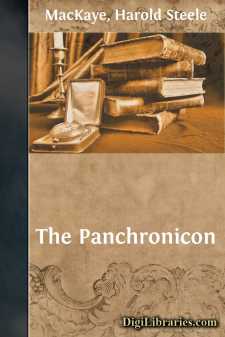Categories
- Antiques & Collectibles 13
- Architecture 36
- Art 48
- Bibles 22
- Biography & Autobiography 813
- Body, Mind & Spirit 142
- Business & Economics 28
- Children's Books 17
- Children's Fiction 14
- Computers 4
- Cooking 94
- Crafts & Hobbies 4
- Drama 346
- Education 46
- Family & Relationships 57
- Fiction 11829
- Games 19
- Gardening 17
- Health & Fitness 34
- History 1377
- House & Home 1
- Humor 147
- Juvenile Fiction 1873
- Juvenile Nonfiction 202
- Language Arts & Disciplines 88
- Law 16
- Literary Collections 686
- Literary Criticism 179
- Mathematics 13
- Medical 41
- Music 40
- Nature 179
- Non-Classifiable 1768
- Performing Arts 7
- Periodicals 1453
- Philosophy 64
- Photography 2
- Poetry 896
- Political Science 203
- Psychology 42
- Reference 154
- Religion 513
- Science 126
- Self-Help 84
- Social Science 81
- Sports & Recreation 34
- Study Aids 3
- Technology & Engineering 59
- Transportation 23
- Travel 463
- True Crime 29
The Panchronicon
Categories:
Description:
Excerpt
CHAPTER I
THE THEORY OF COPERNICUS DROOP
The two sisters were together in their garden.
Rebecca Wise, turned forty and growing slightly gray at the temples, was moving slowly from one of her precious plants to the next, leaning over each to pinch off a dead leaf or count the buds. It was the historic month of May, 1898, and May is the paradise of flower lovers.
Phœbe was eighteen years younger than her sister, and the beauty of the village. Indeed, many declared their belief that the whole State of New Hampshire did not contain her equal.
She was seated on the steps of the veranda that skirted the little white cottage, and the absent gaze of her frank blue eyes was directed through the gate at the foot of the little path bordered by white rose-bushes. In her lap was a bundle of papers yellowed by age and an ivory miniature, evidently taken from the carved wooden box at her side.
Presently Rebecca straightened her back with a slight grimace and looked toward her sister, holding her mold-covered hands and fingers spread away from her.
"Well," she inquired, "hev ye found anythin'?"
Phœbe brought her gaze back from infinity and replied:
"No, I ain't. Only that one letter where Isaac Burton writes her that the players have come to town."
"I don't see what good them letters'll do ye in the Shakespeare class, then."
Rebecca spoke listlessly—more interested in her garden than in her sister's search.
"I don't know," Phœbe rejoined, dreamily. "It's awful funny—but whenever I take out these old letters there comes over me the feelin' that I'm 'way off in a strange country—and I feel like somebody else."
Rebecca looked up anxiously from her work.
"Them sort o' philanderin' notions are foolish, Phœbe," she said, and flicked a caterpillar over the fence.
Phœbe gave herself a little shake and began to tie up the papers.
"That's so," she replied. "But they will come when I get these out, an' I got 'em out thinkin' the' might be somethin' about Shakespeare in 'em for our class."
She paused and looked wistfully at the letters again.
"Oh!" she cried, "how I do wonder if he was among those players at the Peacock Inn that day! You know 'players' is what they called play-actors in those days, and he was a play-actor, they say."
"Did he live very far back, then?" said Rebecca, wishing to appear interested, but really intent upon a new sprout at the foot of the lilac-bush.
"Yes, three hundred years ago. Three of these letters has a date in 1598 exactly."
There was a long silence, and at length Rebecca looked up from the ground to ascertain its cause. She frowned and drew her aching back stiffly straight again.
"Everlastin'ly lookin' at that pictur'!" she exclaimed. "I declare to goodness, Phœbe Wise, folks'll think you're vain as a pouter pigeon."
Phœbe laughed merrily, tossed the letters into the box and leaped to her feet. The miniature at which she had been gazing was still in her hands.
"Folks'll never see me lookin' at it, Rebecca—only you," she said.
Then with a coaxing tone and looking with appealing archness at her sister, she went on:
"Is it really like me, Rebecca?...


